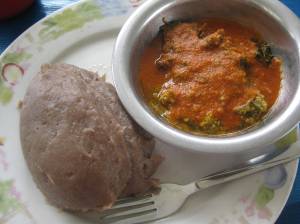In the past two hours the electricity has gone off and come back on three times. The first time I was in the middle of eating dinner, the second time I was reading the paper, the third I was washing dishes. Luckily I only had one plate fatality in the process. Each time it went, my living room turned into a vacuum of total darkness and I just sat there, without any light in hand, wondering if I should get up, grope my way to my room to get my torch or just stay put and hope for subtle flickering of light that indicates light is back. Sitting in the dark gets worrisome after a while because there is no telling when they will bring light back.
Black outs are daily occurrences in Nigeria. Sometimes they last for two hours, sometimes two days. These are not weather induced black outs. They happen because that’s just the way the government run electricity company works here. The power sector of the government is called the Power Holding Company of Nigeria (PHCN), or more commonly known as Please Have Candle Nearby. People still refer to it as NEPA (National Electric Power Authority or more popularly, Never Expect Power Again) because it sounds sweeter saying “NEPA oooh!!!” when they take light than “PCHN!!” I’ve read articles about Nigeria’s electricity problems. Some say the problem is that Nigeria–Africa’s largest oil producer–does not have the capacity to produce enough power for the entire country. The article said Nigeria–a country with a population of roughly 150 million people–was producing 3,500 Megawatts of electricity in 2008. Madison, Wisconsin, a city populated by about 200,000 people produces about 700 Megawatts–that’s one fifth of what this country produces. I’m pretty sure no one in this country thinks ability is what is keeping the government from providing light 24 hours a day, 7 days a week.
I am told that the light situation has not always been this bad, with random daily black outs and days without light. Not so long ago, over 12 years, my friends and teachers say that the papers and news networks would announce the specific times the light was going to go out. So at least there was some organization to the darkness and you would know to avoid doing tasks that required light (like washing dishes) at certain times.
I have become accustomed to the fragility of light. You know you’re used to it when you are in the middle of a sentence when the light goes out, leaving you in pitch blackness, and you keep on talking without any hesitation. Still, I cannot help but wonder who or what decides which areas of the country get light at which times. Is there some big boss man sitting behind a massive switch board flipping switches as he pleases?
At least some people benefit from the instability; the companies who produce generators and rechargeable flashlights are making a killing. My torch light miner’s headband might be the most valuable thing I brought from home. Shoot, they just took light again….
…wait, it’s back again….
This is getting confusing. NEPA make up your mind, abeg.




